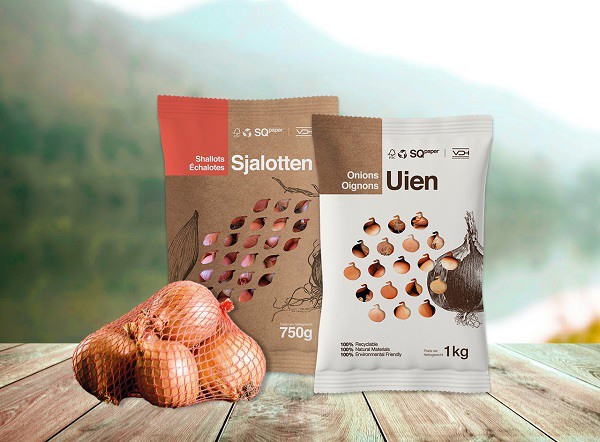Onions have always been packaged in orange netting. But, due to the continued plastic discussion, this type of packaging is set to gradually disappear from stores. VDH Concept is a Belgian packaging development company. It's had two alternatives to these onion nets on offer since the end of last year.

"We've been supplying the Belgian retail sector for 12 years now. And sustainability's never been more of an issue," says the company's Alec van den Heuvel. "However, there's a major bottleneck in the transition to more sustainable packaging - each country's differing rules. One country focuses on compostable packaging; the other prefers recyclable packaging. There's a mountain of regulations in Europe. This can sometimes make the market difficult to understand."
"The European Union has now decided to focus on packaging made of mono-materials. This is packaging that consists of only one type of material, which makes it easier to recycle. We've been working on developing mono-packs for several years. An example of this is SQ Paper. We've developed this fully-recyclable paper packaging ourselves. It's been available in the onion segment since the end of 2020."
SQ Paper
SQ Paper is made of 95% paper and five percent bio-coating and is perfect for packaging onions. "This bio-coating is needed to seal the packaging. Despite its use, the packaging's 100% recyclable, certified and meets European guidelines. Using paper gives the packaging an ecological look and feel. Consumers can, therefore, see at a glance that they're buying sustainable packaging," explains Alec.
"It's also suitable for existing packaging machines. Companies don't need to buy new machines; they just have to adjust them slightly. You can also see the product clearly through the packaging's special perforations. We designed these, and they make SQ Paper unique. We can make these perforations in any shape needed. That allows people to see the products like onions through the packaging's unique holes."
Perforations
"One major advantage of net packaging is that you can see the product perfectly. People can carefully inspect each onion and find any bad ones. We're currently running tests in our factory. We want to try and use as many perforations as possible in the packaging. In this way, the product is optimally visible without its firmness suffering. But, the innovations in the field of optical sorting have dramatically improved the sorting quality," Alec adds.
"So, we can assume the packaging process will eliminate almost 100% of the inferior onions. And, while developing new packaging, we always have to make choices. All packaging has advantages and disadvantages, so it's crucial to find a good balance between these. The final choice always lies with our clients. We always give them several options, and they always agree to one."
Organic netting
VDH Concept offers a second onion packing solution - the Bio Net, made not from plastic but cellulose. "Cellulose is produced from processed wood chips and is, therefore, fully compostable. At first glance, the Bio Net might resemble traditional netting. But the cellulose net really radiates an organic feeling," continues Van den Heuvel.
"It feels significantly different, like textile. Its main advantage is its low entry level. Everyone's familiar with this type of packaging, so people will continue to recognize the product. The difference is, however, really obvious. It's also important that people see and feel they're buying more sustainable packaging."
Circular economy
VDH has been offering sustainable packaging for years. It's only recently that most supermarkets have started seeking solutions. They previously didn't consider this a problem. Over the past few years, several climate treaties, like the Paris Climate Agreement, have been introduced. Since then, supermarket chains have started systematically adapting their packaging ranges. There's been more and more talk of a 'circular economy'. That means all the links in the chain must do their bit.
They must all ensure these climate deals' objectives are actually met. "Within the packaging chain, the packers and supermarkets have already contributed. The problem lies with the waste processors. They're not yet at the point where all materials can be 100% recycled. Although the rest of the chain isn't quite ready, we are. Unfortunately, we have no say in recycling processes. But these first steps bring us ever-closer to a more sustainable chain. That's what we'll be working towards in the coming years," concludes Alec.
 Alec van den Heuvel
Alec van den Heuvel
VDH Concept
Nevierslei 15
2900 Schoten
Belgium
+32(0)368 506 33
support@vdhconcept.com
www.vdhconcept.com
